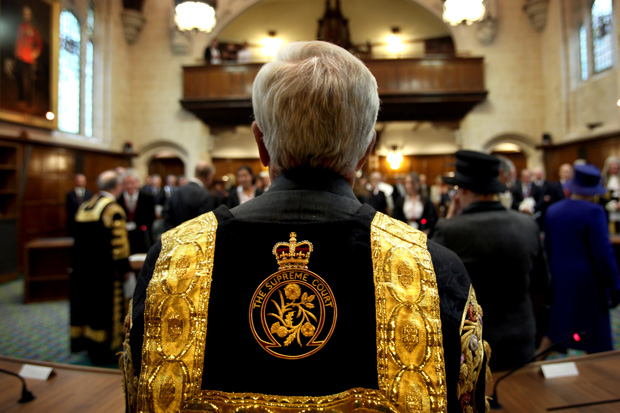Ordinarily, the Supreme Court sits in panels of no more than nine. All 11 justices will hear the government’s appeal, to avoid any suggestion that the composition of the panel might make a difference to the outcome. Caution is understandable: judges differ in philosophy, temperament and in how they understand their role.
Lord Neuberger has been the court’s president since 2012. He has denied that the UK has a (proper) constitution and asserted that joining the European Convention on Human Rights has been a journey from ‘the dark ages’ to ‘the age of enlightenment’. In Nicklinson, two years ago, he was willing to extend human rights law to try to force change in the law of assisted suicide. In the end he held back, preferring to try to nudge Parliament. But his reasoning suggests a willingness to stretch the law if it can be rationalised that Parliament still has the last word. This is confirmed by his misinterpretation of the Freedom of Information Act in Evans (on the Prince of Wales’s letters) last year. Lord Neuberger flouted Parliament’s authority in order to limit an executive power he thought unprincipled.
Lady Hale is the court’s deputy president. Appointed in 2004, she has long been an outspoken judge, publicly enthusiastic about the Human Rights Act and sceptical about parliamentary sovereignty. She has read statutes in ways that clearly depart from Parliament’s intent and in Nicklinson went further than Lord Neuberger in denouncing the Suicide Act.
Lord Kerr is former Lord Chief Justice of Northern Ireland. Termed a ‘human rights hero’ by some, Lord Kerr is another enthusiast for greater judicial power. He agreed with Lord Neuberger in Evans and in Nicklinson; only he and Lady Hale were willing to denounce the Suicide Act.








Comments
Join the debate for just £1 a month
Be part of the conversation with other Spectator readers by getting your first three months for £3.
UNLOCK ACCESS Just £1 a monthAlready a subscriber? Log in